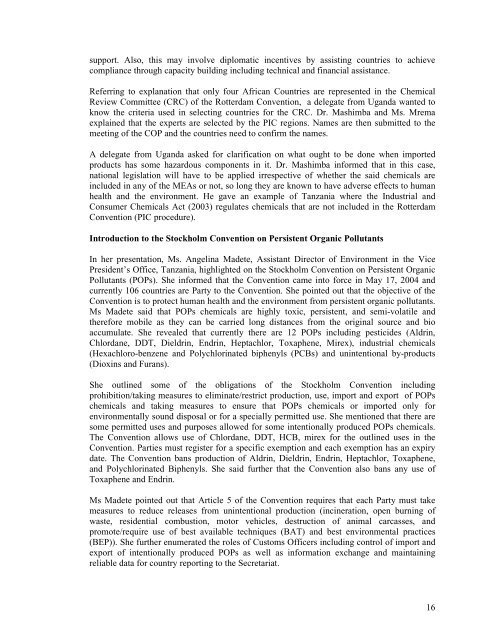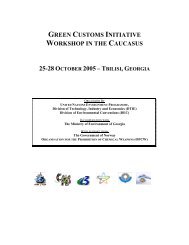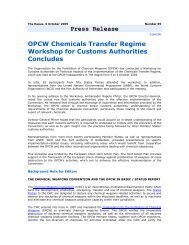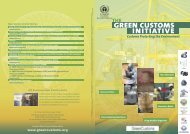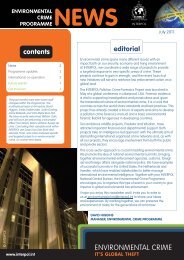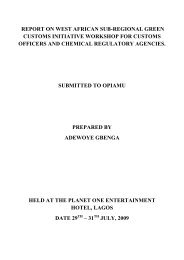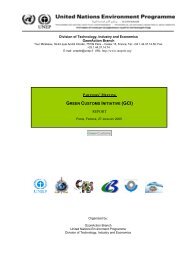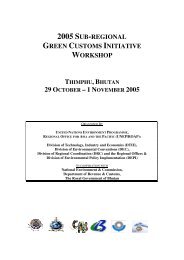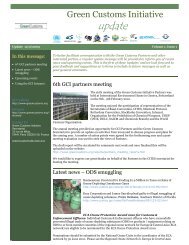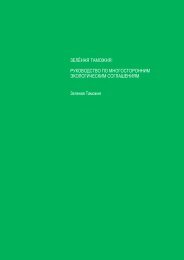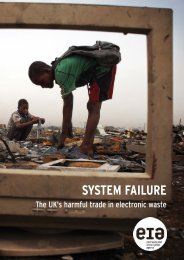Arusha - Green Customs Initiative
Arusha - Green Customs Initiative
Arusha - Green Customs Initiative
Create successful ePaper yourself
Turn your PDF publications into a flip-book with our unique Google optimized e-Paper software.
support. Also, this may involve diplomatic incentives by assisting countries to achieve<br />
compliance through capacity building including technical and financial assistance.<br />
Referring to explanation that only four African Countries are represented in the Chemical<br />
Review Committee (CRC) of the Rotterdam Convention, a delegate from Uganda wanted to<br />
know the criteria used in selecting countries for the CRC. Dr. Mashimba and Ms. Mrema<br />
explained that the experts are selected by the PIC regions. Names are then submitted to the<br />
meeting of the COP and the countries need to confirm the names.<br />
A delegate from Uganda asked for clarification on what ought to be done when imported<br />
products has some hazardous components in it. Dr. Mashimba informed that in this case,<br />
national legislation will have to be applied irrespective of whether the said chemicals are<br />
included in any of the MEAs or not, so long they are known to have adverse effects to human<br />
health and the environment. He gave an example of Tanzania where the Industrial and<br />
Consumer Chemicals Act (2003) regulates chemicals that are not included in the Rotterdam<br />
Convention (PIC procedure).<br />
Introduction to the Stockholm Convention on Persistent Organic Pollutants<br />
In her presentation, Ms. Angelina Madete, Assistant Director of Environment in the Vice<br />
President’s Office, Tanzania, highlighted on the Stockholm Convention on Persistent Organic<br />
Pollutants (POPs). She informed that the Convention came into force in May 17, 2004 and<br />
currently 106 countries are Party to the Convention. She pointed out that the objective of the<br />
Convention is to protect human health and the environment from persistent organic pollutants.<br />
Ms Madete said that POPs chemicals are highly toxic, persistent, and semi-volatile and<br />
therefore mobile as they can be carried long distances from the original source and bio<br />
accumulate. She revealed that currently there are 12 POPs including pesticides (Aldrin,<br />
Chlordane, DDT, Dieldrin, Endrin, Heptachlor, Toxaphene, Mirex), industrial chemicals<br />
(Hexachloro-benzene and Polychlorinated biphenyls (PCBs) and unintentional by-products<br />
(Dioxins and Furans).<br />
She outlined some of the obligations of the Stockholm Convention including<br />
prohibition/taking measures to eliminate/restrict production, use, import and export of POPs<br />
chemicals and taking measures to ensure that POPs chemicals or imported only for<br />
environmentally sound disposal or for a specially permitted use. She mentioned that there are<br />
some permitted uses and purposes allowed for some intentionally produced POPs chemicals.<br />
The Convention allows use of Chlordane, DDT, HCB, mirex for the outlined uses in the<br />
Convention. Parties must register for a specific exemption and each exemption has an expiry<br />
date. The Convention bans production of Aldrin, Dieldrin, Endrin, Heptachlor, Toxaphene,<br />
and Polychlorinated Biphenyls. She said further that the Convention also bans any use of<br />
Toxaphene and Endrin.<br />
Ms Madete pointed out that Article 5 of the Convention requires that each Party must take<br />
measures to reduce releases from unintentional production (incineration, open burning of<br />
waste, residential combustion, motor vehicles, destruction of animal carcasses, and<br />
promote/require use of best available techniques (BAT) and best environmental practices<br />
(BEP)). She further enumerated the roles of <strong>Customs</strong> Officers including control of import and<br />
export of intentionally produced POPs as well as information exchange and maintaining<br />
reliable data for country reporting to the Secretariat.<br />
16


